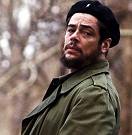|
|
||||
|
|
by Jeffrey Chen  You may have heard that Che is a four-hour-plus movie, but it's really two distinct movies: Che: Part One, additionally titled The Argentine outside the U.S., and Che: Part Two, additionally titled Guerilla. The Steven Soderbergh-directed films have rather high-minded artistic pedigree and display a lot of thought and creative technique behind them, enough so that it wouldn't be fitting to call them badly-made movies. This makes them tough to dismiss offhand because one is respectful of the ambition and the approach. However, they are also quite dispassionate, which causes one to wonder why the films go through all their length and techniques in the first place without including much in the way of perspective. For all the obvious work put into them, I'm disappointed by the curiously empty feeling they left behind. Both movies are, of course, about Ernesto "Che" Guevara, the iconic Argentine revolutionary of the mid-20th century, here played by a quite similarly featured Benicio Del Toro. Guevara's face is perhaps the most famous worldwide, and it has become a symbol of counterculture. Though he is (almost blindly) revered by much of the populace, he remains controversial because of his use of guerilla tactics and advocation of violence. Such a man inspires passion, but apparently not so much in these films. They are documentary-like and observational; they do not move with the narrative arc of a drama but rather with the detached feel of watching other people do work. They sacrifice involvement potential for accuracy and mundane details. And although this might seem laudable to those who prefer the clarity of objectivity and the chance to form their own thoughts rather than be manipulated by dramatic devices, Che has an additional problem because it doesn't give its audience very much to work with. Having a history book approach means we don't get much here that can't be read from history books. The man is shown with his ideals already set. His personality comes across like what we'd expect it to be, or, perhaps more precisely, what Che Guevara devotees would expect it to be: competent, determined, disciplined, strict, kind to the poor, and always enforcing his code of honor. When he speaks of these ideals, they are platitudinal and exactly what we think he would say. We see him do his job, but we don't get close to him; we are in the same seat as his followers, respectful and in awe. In my review of The Motorcycle Diaries, the Walter Salles film about Guevara's pre-guerilla traveling days, I claimed being bothered by the sanctification of the character. With Che, I'm beginning to think this is endemic to the population at large -- in Soderbergh's films, because we don't get that much insight into the human being, the distance it creates between him and the audience serves to increase his messiah status (so much to the point that Del Toro's performance becomes a non-issue, he's just filling up the character's space). He is shown doing good deeds, such as using his physician skills to heal the ill peasantry. His Part One adversary, the Cuban dictator Fulgencio Batista, isn't given any dimension or context so he's assumed to be evil, thus ennobling Guevara (and his commander Fidel Castro, played by Demián Bichir) and justifying their guerilla tactics. If there's any criticism of the man to be made, it comes from viewing Part Two alongside Part One, and perhaps this is the main justification for watching the two, one right after the other. They form a comparison contrast -- Part One is about Guevara's successful mission in Cuba, where the peasants flock to him and his soldiers are competent and believe in the cause. Part Two covers his final, failed stint in Bolivia, where he tries to lead a revolution in a similar manner, only to be thwarted by peasants who start believing their government more and followers who aren't quite so disciplined. The overall arc implies that although Guevara can be admired for his ideals, his one-solution-fits-all modus operandi doesn't work in all of the real world. But that might be the closest we get to some kind of dissection, any kind of analysis or thesis. In viewing Part Two, Guevara's reputation is in place and he is revered by those who serve him and encounter him. The closer he gets to his inevitable demise, the more martyr points he gains. His operations fall apart due to small-minded betrayals of ideals, so he's not at fault for what he preaches. He ends the movie as he began: as a symbol, someone so steadfast in his ideas that those ideas transcend his very humanity. Che Guevara, it seems, shall ever be a symbol, and Che doesn't even seem interested in cracking that, thus leaving us no more enlightened than when we stepped in. (Released by IFC Films; not rated by MPAA.) Review also posted at www.windowtothemovies.com |
||
|
© 2026 - ReelTalk Movie Reviews Website designed by Dot Pitch Studios, LLC |



